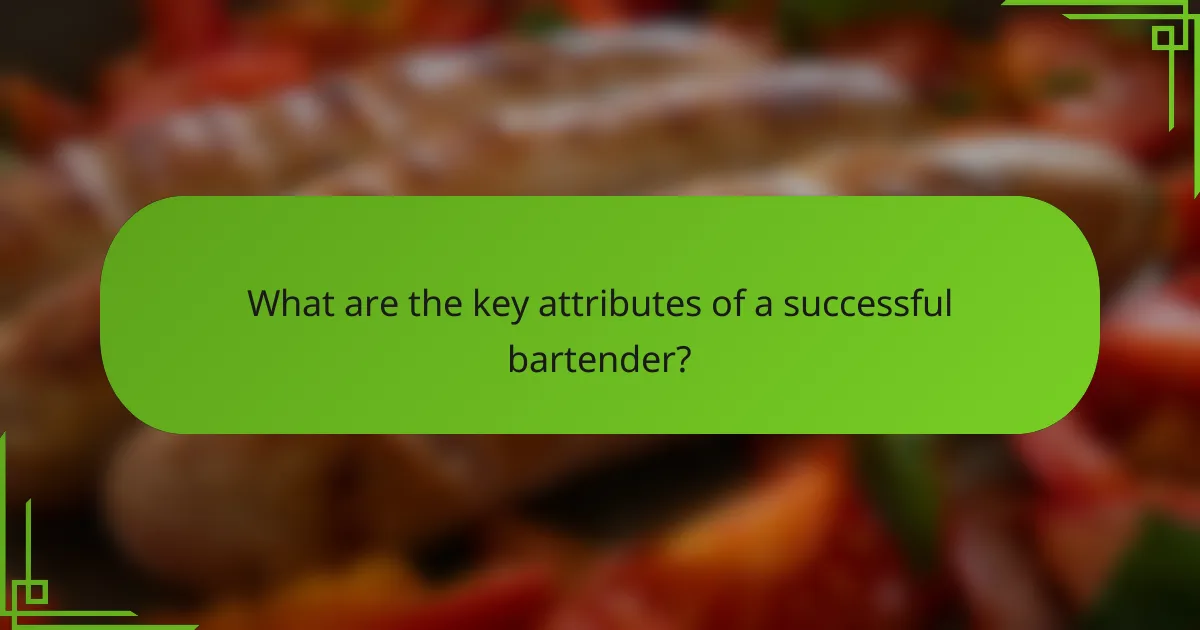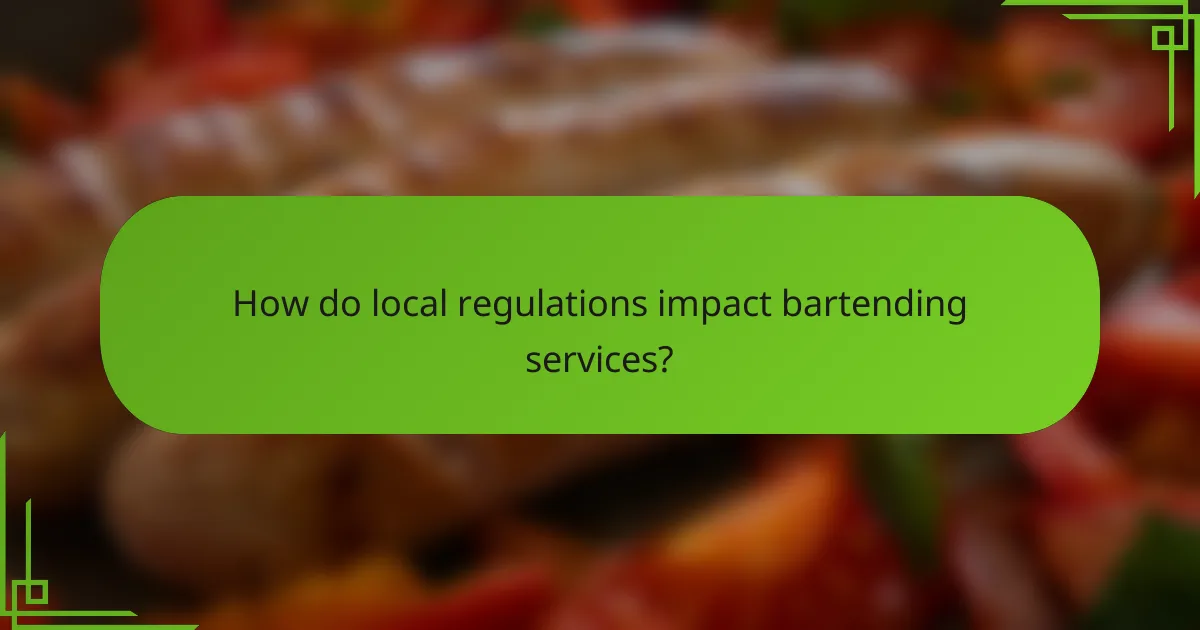Bartenders play a vital role in enhancing the overall experience in bars and restaurants through their professionalism, efficiency, and ability to customize services. By undergoing rigorous training and adhering to industry standards, they ensure high-quality service that elevates customer satisfaction. Additionally, their expertise in optimizing workflows and personalizing drink selections allows them to cater to individual preferences, creating memorable interactions for patrons.

How do bartenders enhance professionalism in Los Angeles?
Bartenders in Los Angeles enhance professionalism through rigorous training, adherence to industry standards, and effective communication. This commitment not only improves service quality but also elevates the overall customer experience in the vibrant bar scene.
Training and certification programs
Many bartenders in Los Angeles participate in formal training and certification programs that cover essential skills such as mixology, customer service, and alcohol safety. Programs like the Bartending School of Los Angeles offer comprehensive courses that can last from a few weeks to several months.
Certification can also include Responsible Beverage Service (RBS) training, which is crucial for understanding local laws regarding alcohol service. This training ensures that bartenders are knowledgeable about safe serving practices and legal requirements.
Adherence to industry standards
Bartenders in Los Angeles follow established industry standards to maintain a high level of professionalism. This includes understanding proper drink preparation techniques, maintaining cleanliness, and ensuring that all beverages are served at the correct temperatures.
By adhering to these standards, bartenders not only enhance their skills but also build trust with customers, leading to repeat business and positive reviews. Regular training sessions and workshops help bartenders stay updated on the latest trends and best practices.
Effective communication skills
Effective communication is a key component of professionalism for bartenders in Los Angeles. This includes not only taking orders accurately but also engaging with customers to create a welcoming atmosphere. Good bartenders listen actively and respond to customer preferences and feedback.
Additionally, bartenders often need to communicate clearly with kitchen staff and other team members to ensure smooth service. Developing strong interpersonal skills can significantly enhance the overall customer experience and foster a positive bar environment.
Appearance and grooming standards
In Los Angeles, bartenders are expected to maintain a polished appearance that reflects the establishment’s brand. This often includes wearing appropriate uniforms or attire that is clean and well-fitted. Personal grooming is equally important, as it contributes to the overall professionalism of the service.
Establishments may have specific guidelines regarding hairstyles, tattoos, and piercings, which bartenders should adhere to in order to align with the venue’s image. A professional appearance not only instills confidence in customers but also enhances the bartender’s credibility.

What efficiency benefits do bartenders provide?
Bartenders enhance efficiency in service by optimizing workflows, utilizing technology, and speeding up drink preparation. These benefits lead to quicker service times and improved customer satisfaction, crucial in busy environments like bars and restaurants.
Streamlined service processes
Streamlined service processes involve organizing tasks to minimize wait times and maximize productivity. Bartenders often establish clear roles, such as separating drink preparation from serving, which allows for simultaneous actions and reduces bottlenecks.
For instance, implementing a system where one bartender focuses on mixing drinks while another handles customer interactions can significantly speed up overall service. This division of labor is essential during peak hours when demand is high.
Use of technology for order management
Technology plays a vital role in modern bartending, particularly through point-of-sale (POS) systems that manage orders efficiently. These systems allow bartenders to take orders directly from customers and send them to the kitchen or bar instantly, reducing the chances of errors and delays.
Mobile order-taking devices can further enhance efficiency by allowing bartenders to process orders while moving around the bar area. This capability helps maintain a smooth flow of service, especially in crowded venues.
Speed in drink preparation
Speed in drink preparation is crucial for maintaining customer satisfaction and managing high volumes of orders. Experienced bartenders often rely on techniques and tools that allow them to mix drinks quickly without compromising quality.
For example, using pre-prepared mixers and garnishes can cut down on preparation time. Additionally, bartenders may employ batching techniques for popular cocktails, allowing them to serve multiple customers faster. Training staff in efficient pouring and mixing methods can also enhance overall speed.

How do bartenders customize experiences for clients?
Bartenders customize experiences for clients by tailoring drink selections, event services, and adapting to individual preferences. This personalization enhances customer satisfaction and creates memorable interactions.
Personalized drink recommendations
Bartenders often assess a client’s tastes and preferences to suggest drinks that align with their likes. This could involve asking about favorite flavors, spirits, or even mood to create a tailored cocktail experience. For example, if a client enjoys fruity flavors, a bartender might recommend a refreshing mojito or a berry-infused gin and tonic.
Additionally, bartenders can create signature cocktails that reflect the client’s personality or the theme of an event, making the experience unique. This approach not only showcases the bartender’s expertise but also fosters a connection with the client.
Tailored event services
For events, bartenders can customize their services to meet specific needs, such as creating themed drink menus or offering a selection of signature cocktails. They may also provide mobile bar setups, ensuring that the service fits the venue and the occasion, whether it’s a wedding, corporate event, or private party.
Understanding the event’s demographics helps bartenders suggest appropriate drink options and quantities, ensuring guests have a satisfying experience. For instance, a summer garden party might feature light and refreshing cocktails, while a winter gathering could focus on warm, spiced drinks.
Adaptation to customer preferences
Bartenders excel at adapting to customer preferences by observing and responding to feedback during service. If a client expresses dissatisfaction with a drink, a skilled bartender will offer to modify it or suggest an alternative that better suits their taste.
Moreover, bartenders can accommodate dietary restrictions or preferences, such as offering non-alcoholic options or using organic ingredients. This flexibility not only enhances the customer experience but also builds loyalty, as clients appreciate personalized attention and care.

What are the key attributes of a successful bartender?
A successful bartender possesses a blend of skills that enhance professionalism, efficiency, and customization in service. Key attributes include a deep understanding of mixology, exceptional customer service skills, and the ability to multitask effectively in a fast-paced environment.
Knowledge of mixology
Knowledge of mixology is fundamental for any bartender, as it involves understanding the art and science of crafting cocktails. This includes knowing the ingredients, techniques, and presentation styles that make drinks appealing and enjoyable.
Successful bartenders should be familiar with classic recipes, as well as current trends in the beverage industry. This knowledge allows them to create signature cocktails that cater to diverse customer preferences, enhancing the overall experience.
Customer service skills
Excellent customer service skills are crucial for bartenders, as they directly impact customer satisfaction and loyalty. Bartenders should be approachable, attentive, and skilled in communication to ensure that patrons feel valued and understood.
Effective customer service also involves reading the room and adjusting the approach based on the clientele. For instance, a lively bar may require a more energetic interaction, while a quieter setting may call for a more subdued demeanor.
Ability to multitask
The ability to multitask is essential for bartenders, who often juggle multiple orders and customer interactions simultaneously. This skill helps maintain efficiency during busy shifts, ensuring that drinks are prepared quickly and accurately.
To improve multitasking, bartenders can prioritize tasks based on urgency, such as serving customers who are waiting at the bar versus those who are seated. Developing a systematic approach to drink preparation can also streamline workflow and reduce errors.

How do local regulations impact bartending services?
Local regulations significantly influence bartending services by establishing the legal framework within which bartenders must operate. These rules can dictate everything from licensing to health standards, ensuring that services are safe and compliant with community expectations.
Licensing requirements in California
In California, bartenders must obtain a license to serve alcohol, which typically involves completing a responsible beverage service training program. This training covers topics such as checking IDs, recognizing signs of intoxication, and understanding local alcohol laws.
Additionally, establishments serving alcohol must have a valid liquor license, which can vary based on the type of service (e.g., on-sale vs. off-sale). It’s crucial for bartenders to be aware of these requirements to avoid penalties or business closures.
Health and safety regulations
Health and safety regulations in California require bartenders to maintain high standards of cleanliness and food safety. This includes proper sanitation of glassware and equipment, as well as ensuring that food items served alongside drinks meet health codes.
Bartenders should also be familiar with local health department guidelines regarding the handling of perishable items and the prevention of cross-contamination. Regular training and adherence to these regulations help maintain a safe environment for both staff and patrons.

What are the emerging trends in bartending?
Emerging trends in bartending focus on enhancing professionalism, efficiency, and customization in drink preparation and service. Bartenders are increasingly adopting innovative techniques and technologies to meet evolving customer expectations and improve the overall experience.
Professionalism
Professionalism in bartending is characterized by a deep knowledge of spirits, cocktails, and customer service. Bartenders are now expected to have formal training and certifications, which can include mixology courses and customer service workshops. This shift elevates the role of bartenders from mere drink servers to skilled professionals who can craft unique experiences.
To enhance professionalism, bartenders should stay updated on industry trends, attend workshops, and engage in continuous learning. This can include participating in competitions or networking with other professionals to exchange knowledge and techniques.
Efficiency
Efficiency in bartending is crucial for managing busy service environments. Techniques such as mise en place—preparing ingredients and tools before service—help bartenders serve drinks quickly and accurately. Additionally, using technology like point-of-sale systems can streamline order processing and inventory management.
To improve efficiency, bartenders can implement a well-organized workstation and practice multitasking. Training staff on efficient service techniques can also reduce wait times and enhance customer satisfaction.
Customization
Customization is a growing trend where bartenders create personalized drink experiences for customers. This can involve tailoring cocktails based on individual preferences, dietary restrictions, or seasonal ingredients. Customers appreciate the attention to detail and the opportunity to enjoy unique, bespoke drinks.
To offer customization, bartenders should engage with customers to understand their tastes and preferences. Keeping a diverse selection of spirits and mixers on hand allows for greater flexibility in crafting personalized cocktails.


